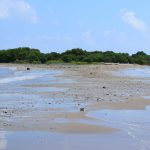EFL concluded Phase III of the Kelani River Water Quality Restoration Programme, which was funded by The Asia Foundation. The project was EFL’s latest intervention to restore the deteriorating water quality of Sri Lanka’s most polluted river, which supplies 80% of water to Greater Colombo. Factory waste from industrial zones, as well as garbage dumping by riverine communities, has degraded river ecosystems which is turn support livelihoods and provide crucial ecosystem services. In this phase, EFL extended its awareness raising efforts
Tourism has a symbiotic and occasionally parasitic relationship with biodiversity. Biodiversity pulls in visitors with the wildlife and the aesthetic beauty that is associated with pristine natural habitats and in turn, the revenue generated from tourism can go towards conservation efforts and upkeep of protected areas. However, unchecked and unsustainable tourism degrades natural environments, destroying the very thing that attracted visitors there in the first place. Tourism plays a prominent role in Sri Lanka’s post-war economy, generating $US 2.2 billion
From conserving habitats to preventing illegal wildlife trade, the law is a crucial instrument in protecting Sri Lanka’s biodiversity and ensuring that endangered and endemic species are not forgotten and lost in waves of development. While Sri Lanka is bound by international conventions such as the Convention on Biological Diversity and the Convention on International Trade in Endangered Species of Wild Fauna and Flora, it has a diverse range of domestic legislature under which biodiversity is governed and considered. Biodiversity
Despite global recognition for their biodiversity, Sri Lanka’s moist tropical evergreen forests seem to be less valued by its citizens, as development goals and population pressures have steadily eroded forest cover, often leaving only isolated patches which still sustain rare and endemic species. Buoyed by green credibility and a conducive policy framework that was afforded to renewable energy, mini hydro power projects have mushroomed in the South-west, harnessing water sources that are often found in pristine and untouched rainforests. While the
Kalapu Andara, Mesquite, or scientifically known as Prosopis juliflora, is a perennial shrub belongs to the legume family, family Fabaceae. Native to Central and South America and the Caribbean region, it has been introduced to Africa, Asia and Australia where it has been naturalized. In 1880 it was intentionally introduced to Sri Lanka as a shade and erosion control tree, in the Hambantota and Puttalam districts. Mesquite is a medium sized tree with an average height about 5m, with an ashy
Alien is a term everyone is familiar with – creatures with long limbs and large eyes come to mind, like E.T. the Extra-Terrestrial from the popular 80s movie. While the existence of extra terrestrial life has been long debated, Sri Lanka is vulnerable to a very real threat from alien species of a different nature. These organisms travel a considerably smaller distance on earth (compared to E.T. from outer space) to colonise Sri Lankan soil and waters. Simply put, an
We have all heard of “invasive species”, but what are they really, and why are they such a big problem? Through natural and man-made processes, many species are introduced to areas outside of their normal range – these are known as non-native, or “alien” species. Many of these alien species will not be able to adapt to the new environment at all, and may eventually die off. Today, as with the rest of the world, hundreds of new species of
EFL held a successful awareness session for financial institutions on the detrimental environmental, social and financial consequences of investing in mini hydro projects in ecologically sensitive areas. The awareness session was held on the 10th of June 2016 at the Sri Lanka Foundation Institute in collaboration with Sri Lanka Water Partnership and was attended by representatives of major banks including National Development Bank, Sampath Bank, National Savings Bank, and Peoples Bank as well as representatives from the Central Environmental Authority.
EFL initiated a water policy dialogue for industrial stakeholders, with the objective of identifying key loopholes and deficiencies in existing mechanisms for curtailing water pollution by industries and making recommendations for amendments to existing laws, regulations and procedures at a policy level to ensure stringent, proactive systems of evaluating, monitoring and implementation. The dialogue aimed to encourage the active engagement of industries as stakeholders willing to adopt voluntary standards and preventive measures to protect and conserve the environment. Recommendations from the
The aim of this Policy Dialogue was to bring all the relevant stakeholders to a common platform to establish responsibilities and collectively develop a long term, proactive solution to prevent future industrial disasters. EFL believes that the existing Policy and Legislation for curtailing industrial pollution is firm, however we believe there is a need for effective enforcement of laws and a highly stringent monitoring mechanism to verify that all standards are met. This forum was created to identify the problems and barriers faced
- 1
- 2





